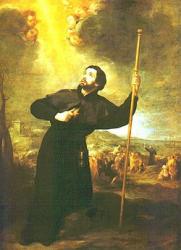- |
User Links
My God, I Love Thee, Not Because

My God, I love Thee, not because
Author (attributed to): St. Francis Xavier; Translator: Edward Caswall (1849)Published in 214 hymnals
Printable scores: PDF, MusicXMLPlayable presentation: Lyrics only, lyrics + musicAudio files: MIDI, Recording
Representative Text
1 My God, I love Thee, not because
I hope for heav'n thereby,
nor yet for fear that, loving not,
I might forever die.
But for that Thou didst all mankind
upon the cross embrace;
for us didst bear the nails and spear,
and manifold disgrace;
2 And griefs and torments numberless,
and sweat of agony,
e'en death itself, and all for man,
who was Thine enemy.
Then why, most loving Jesus Christ,
should I not love Thee well?
Not for the sake of winning heav'n,
nor any fear of hell;
3 Not with the hope of gaining aught,
nor seeking a reward,
but as Thyself hast loved me,
O ever-loving Lord!
E'en so I love Thee, and will love,
and in Thy praise will sing,
solely because Thou art my God,
and my eternal King!
Source: Psalms and Hymns to the Living God #336
Author (attributed to): St. Francis Xavier
 St. Francis Xavier, the great missionary saint of the Roman Catholic Church, was the son of Don John Giasso and Donna Maria d'Azpilqueta y Xavier; he was born at the castle Xavier, near Pampeluna, Spain, on April 7, 1506, and is known to history by his mother's name. At the age of eighteen he entered the University of Paris, where in due course he graduated, and then devoted himself to teaching. It was here that he became acquainted with Ignatius Loyola the founder of the Jesuits, who was then planning the colossal work which he afterwards accomplished. Xavier became one of the first nine of Loyola's converts, and the most enthusiastic of the little band. The date of the formation of the Order of the Jesuits is given as Aug. 15, 1534, and t… Go to person page >
St. Francis Xavier, the great missionary saint of the Roman Catholic Church, was the son of Don John Giasso and Donna Maria d'Azpilqueta y Xavier; he was born at the castle Xavier, near Pampeluna, Spain, on April 7, 1506, and is known to history by his mother's name. At the age of eighteen he entered the University of Paris, where in due course he graduated, and then devoted himself to teaching. It was here that he became acquainted with Ignatius Loyola the founder of the Jesuits, who was then planning the colossal work which he afterwards accomplished. Xavier became one of the first nine of Loyola's converts, and the most enthusiastic of the little band. The date of the formation of the Order of the Jesuits is given as Aug. 15, 1534, and t… Go to person page >Translator: Edward Caswall
 Edward Caswall was born in 1814, at Yately, in Hampshire, where his father was a clergyman. In 1832, he went to Brasenose College, Oxford, and in 1836, took a second-class in classics. His humorous work, "The Art of Pluck," was published in 1835; it is still selling at Oxford, having passed through many editions. In 1838, he was ordained Deacon, and in 1839, Priest. He became perpetural Curate of Stratford-sub-Castle in 1840. In 1841, he resigned his incumbency and visited Ireland. In 1847, he joined the Church of Rome. In 1850, he was admitted into the Congregation of the Oratory at Birmingham, where he has since remained. He has published several works in prose and poetry.
--Annotations of the Hymnal, Charles Hutchins, M.A. 1872… Go to person page >
Edward Caswall was born in 1814, at Yately, in Hampshire, where his father was a clergyman. In 1832, he went to Brasenose College, Oxford, and in 1836, took a second-class in classics. His humorous work, "The Art of Pluck," was published in 1835; it is still selling at Oxford, having passed through many editions. In 1838, he was ordained Deacon, and in 1839, Priest. He became perpetural Curate of Stratford-sub-Castle in 1840. In 1841, he resigned his incumbency and visited Ireland. In 1847, he joined the Church of Rome. In 1850, he was admitted into the Congregation of the Oratory at Birmingham, where he has since remained. He has published several works in prose and poetry.
--Annotations of the Hymnal, Charles Hutchins, M.A. 1872… Go to person page >Text Information
Related Texts
| First Line: | My God, I love Thee, not because |
| Title: | My God, I Love Thee, Not Because |
| Latin Title: | O Deus, ego amo Te |
| Translator: | Edward Caswall (1849) |
| Author (attributed to): | St. Francis Xavier |
| Meter: | 8.6.8.6 |
| Language: | English |
| Copyright: | Public Domain |
Notes
Access an additional article on the Canterbury Dictionary of Hymnology:


 My Starred Hymns
My Starred Hymns





